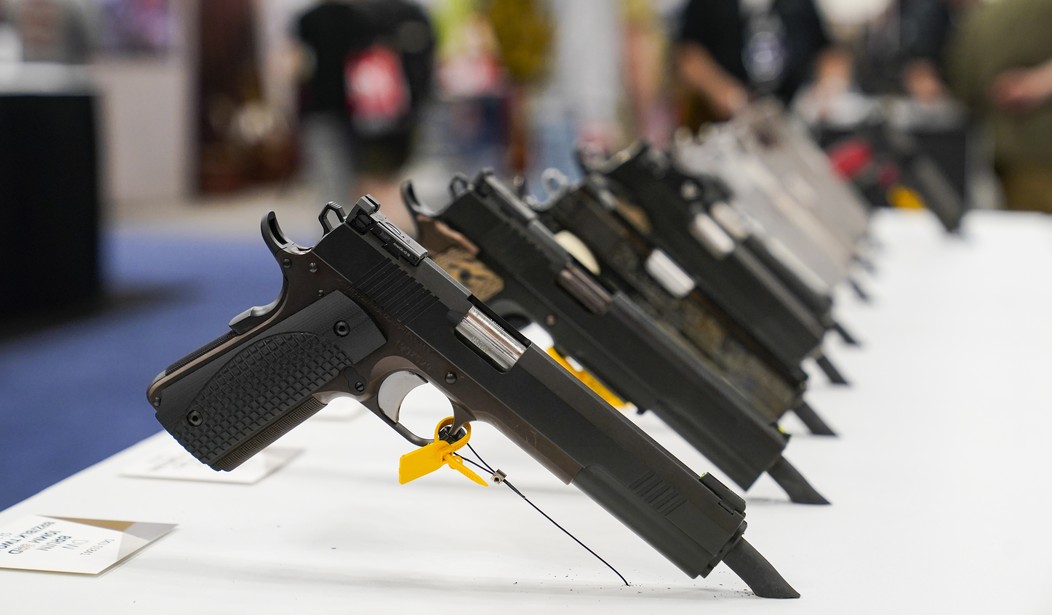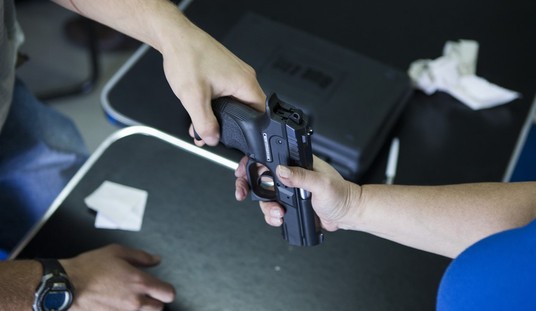We've got a lot of issues in this country. Despite that, I maintain it's the best country in the world, but I'll admit I'm incredibly biased. I understand why one of our problems is illegal immigration, for example. Who wouldn't want to live in the greatest nation on Earth?
I'm not excusing it, mind you, I'm just saying I get why people want to come here and aren't interested in waiting years to maybe be permitted to immigrate lawfully.
But not everyone who comes here for a better life. Many are coming here for illicit purposes. That's part of the issue.
For a while now, Mexico has blamed the United States for another reason many come here: To get away from cartel violence. In fact, they're suing gun manufacturers here in the United States.
We know this, of course, but 60 Minutes decided to take a look at the lawsuit. And it's a decidedly one-way look.
See, it starts with reporter Sharyn Alfonsi. She was the one responsible for taking a look at the whole thing, and she even reached out to a gun store for the other side of the story. One gun store.
That store declined to be interviewed, which I don't blame them for. This is the same news program that heavily edited its interview with Vice President Kamala Harris to make her look coherent when, well, she wasn't.
But let's look at some of the "highlights" of the interview.
If you think fentanyl overdoses, immigration and organized crime are problems, then you should care about stopping the gun pipeline from the U.S. to Mexico, says attorney Jonathan Lowy. "You need to stop it at its source," says Lowy. https://t.co/ZTVJabeWIG pic.twitter.com/WAVu4En4w0
— 60 Minutes (@60Minutes) December 23, 2024
Now, that's not an inaccurate point. If the border is an issue, then things going across that shouldn't be going across from both directions is a serious problem and we should probably work together to address this.
First, though, let's not that while 48 percent of illegal immigrants are Mexican, that means 52 percent of them aren't. Yet more than 75 percent of them travel through Mexico to enter the United States. If guns going into Mexico is the problem, then why are so many others coming from South America?
And what about illegal immigration from before the rise of the cartels? This isn't a new issue, after all.
Plus, let's not forget that while we have never authorized gun smuggling south, the Mexican government has actually published guides to help illegal immigrants.
Additionally, there's a massive difference between fentanyl, the cartels, and guns.
The cartels and fentanyl aren't exactly legal in Mexico in the first place. These are illegal there but the Mexican government has done jack-all to address the problem, which then spills into the United States. Guns are lawful products here and that means it's a little different. People can lawfully purchase firearms.
Transporting them south into Mexico is a crime, and people have been arrested for trying it, but the lawsuit doesn't actually address that. It basically blames gun companies for what's happening on down the chain.
Of course, Lowry has an "argument" for that. I put that in quotes because what he says glosses over a whole lot.
"Manufacturers, and dealers, and distributors all get trace data," says attorney Jonathan Lowy. “When manufacturers make the decision, ‘We're going to sell guns through dealers no matter what their record is’…that's on them,” says attorney Jonathan Lowy. pic.twitter.com/T9kXQm59VL
— 60 Minutes (@60Minutes) December 23, 2024
That sounds great on TV, but a lot of gun manufacturers are actually selling to distributors. They know that the gun they've traced went to a given distributor, but since those distributors may sell their guns to thousands of gun stores, that trace data doesn't show them all that much.
Plus, I may be wrong here, but I doubt they get the totality of the trace data, including whether a gun was actually used in a crime or not. Guns get traced for a ton of reasons and not all of them were because they were used in a horrific murder. I don't know how much information the ATF even gives them about the trace, only that they need the information on a particular firearm.
That's it.
And one of the things they don't necessarily get is "time to crime." They can figure it out, though, which is an important point, because guns don't stay in the hands of the original purchaser all the time. People buy guns, then money gets tight and they sell a few off to help make ends meet years later. Guns get stolen well after their original purchase. And yes, guns get bought via a straw purchase and smuggled across the border almost immediately, only to be recovered years after that happened.
The gun manufacturers don't know which is which and they have no reason to just cut off a gun store because guns that were originally sold them them may have ended up in the wrong hands years later through absolutely no wrongdoing on their part.
Plus, straw buys aren't as easy to spot as they might like to think, though Lowy seems to believe the are.
“You see these multiple sales of AR-15s, you see these large cash payments, you see these persons comin' back to the store every few days or every few weeks. I mean, these are not normal buying patterns,” says lawyer Jonathan Lowy. pic.twitter.com/NDZuvKfVzo
— 60 Minutes (@60Minutes) December 23, 2024
Well, they're not normal buying patterns for a lot of people, sure, but I've known plenty of folks where it was.
See, a lot of gun people like a lot of guns. They don't get just one AR-15. They get three. Then, a few weeks later, they come in and buy more.
I had a friend and coworker who lived...well, let's just say he was "frugal." Cheap is probably a better word. He lived in such a way that he could probably have been fine on minimum wage. Yet we worked for a large defense contractor making pretty good money. After he started making that good money, he started buying guns. Like, several per week.
According to Lowy, that's not "normal" and he should have been denied the purchases because he was clearly a straw buyer.
Except, the last time I talked to him, he still had them all. In fact, he was trying to sell a couple by having the gun store take them on consignment and was worried about the ATF deciding he was doing something shady. I told him he had nothing to worry about, really, because he was going through a licensed dealer, but it's clear he wasn't a straw buyer.
"But spending cash, Tom! What about all that cash."
I'm sorry, but considering how credit card companies say they want to track gun purchases, and most people who aren't using cash are using a debit card with a credit card company's logo on the front, is anyone surprised if lawful gun buyers are withdrawing cash from the bank and using that?
However, most of the 60 Minutes interview is with Lowy or people sympathetic to the lawsuit.
There doesn't seem to be any mention of reaching out to gun rights groups, the NSSF, or pretty much anyone outside of those supportive of the lawsuit. As a result, it presents a blatantly biased look at the lawsuit and the supposed fault of firearm manufacturers.
I'd say that 60 Minutes should be ashamed of itself, but since it's clear no one there is capable of feeling shame, I won't.







Join the conversation as a VIP Member